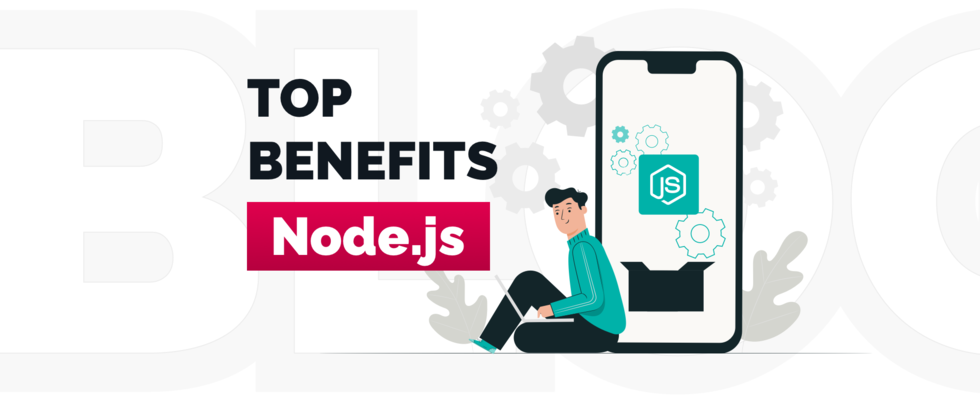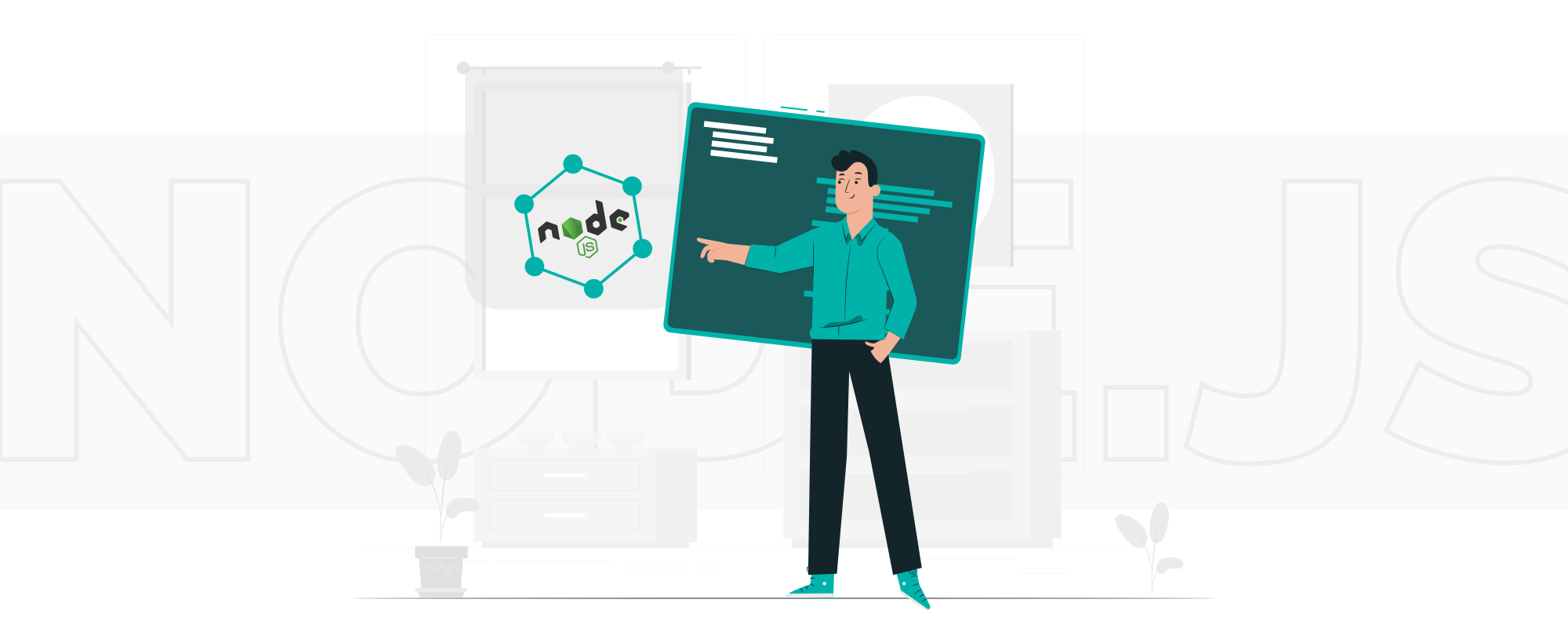Why Use Node.js for Building Web Apps? Advantages of Node.js Web Development

Team Lead & Senior Front-End Engineer at TechMagic. Member of Solution Architecture Group. Passionate about JavaScript and AWS.

What are the advantages of app software development with Node.js? Explore the benefits of Node.js web application development as well as drawbacks.
Front-end web development has been dominated by JavaScript features for years. Google, Facebook, Wikipedia, and the majority of all online pages use JS for client-side operations. Recently, it also made a shift to cross-platform mobile development as a core technology in React Native, Nativescript, Apache Cordova, and other hybrid tools.
Over the last few years, Node.js moved to backend development, too. Developers want to use the same tech stack for the entire web project without having to learn a new language for server-side development. Node.js is a tool that adapts JS functionality and syntax to the backend.
What is Node.js?
Node.js is not a language, or library, or framework. It’s a runtime environment: typically JavaScript needs a browser to function, but Node.js creates suitable settings for JS to run outside of the browser. It’s built on a JavaScript V8 engine that can run in Chrome, other browsers, or standalone.
The scope of V8 is to transform JS browser-oriented code into machine code — so JS becomes a general-purpose language and can be understood by servers. This is one of the benefits of using Node.js in web app development: it broadens the functionality of JavaScript, allowing developers to integrate the language with APIs, other languages, and external libraries.
What do you need to get started?
To start working with Node.js, you need to install the runtime environment itself, Node Package Modules, integrated development environment, and frameworks.
- Node.js files: start by downloading the latest version of the environment for Windows or macOS. NPM comes in the package — you will need it to install additional functionality and get access to new modules. To learn more about installation, take a look at the official guide.
- Official documentation: if you are unfamiliar with language’s syntax and functionality, take a look at the official library. Here, you’ll find guides to simple tasks (like typing “Hello World”) and a detailed overview of basic and additional functionality.
- IDEs that support Node.js: most code editors work well with Node.js, but the best ones are WebStorm, Atom, and VS Code.
- Node.js frameworks: they offer templates, libraries, automation features, display interfaces that make development easier. The best Node.js frameworks on the market are Meteor, Express.js, Koa.js, but there are more.
One of the main advantages of Node.js software development is that it’s a language designed with backend development in mind. Unlike general-purpose languages (Java, Python, etc.), its functionality is not overly complex because the runtime environment doesn’t aim to cover many niches simultaneously. For example, Node.js vs Ruby on Rails.
Let’s take a look at other advantages of Node.js web application development.

What Are the Advantages of Node.js Web Application Development?
Lately, companies have been actively switching from their backend tech stacks to Node.js. LinkedIn chose Node.js over Ruby on Rails because it handled increasing workload better and helped reduce the number of servers by 10 times. PayPal and Netflix did a similar thing, only they had an intention to change their architecture to microservices. Let’s take a closer look at the reasons to choose Node.JS for web app development.
Powerful tech stack for web development
The first thing that makes Node.js a go-to environment for web development is its JavaScript heritage. It’s the most popular language right now with millions of free tools and an active community. Node.js, due to its connection to JS, quickly rose in popularity — now it has more than 368 million downloads and thousands of free tools in the package module.
Along with popularity, Node.js also inherited the main JS advantages:
- fast performance and data processing;
- highly reusable code;
- the code is easy to learn, write, read, and maintain;
- huge resource library, thousands of free guides, and an active community.
On top of that, it’s a part of a popular MEAN tech stack (the combination of MongoDB, Express.js, Angular, and Node.js — four tools that handle all crucial aspects of web app development).
Developers can use JavaScript for the entire project
This is one of the most obvious benefits of Node.js web app development. JavaScript is a must-know language for web development. Whether you build a multi-page or single-page app, you need to know JS well. If you are already comfortable with JavaScript, learning Node.js will not be a problem. Syntax, basic functionality, structural principles — all these things are similar.
If you have JS developers in your team, it will be easier for them to learn JS-based Node than an entirely new language. On top of that, the front-end and back-end codebase will be very similar, easy to read, and maintain — because they are both JS-based.
A fast environment for microservice development
There’s another reason why Node.js became popular so quickly. The environment suits well the concept of microservice development (spilling monolith functionality into dozens or hundreds of smaller services).
Microservices need to communicate with each other quickly — and Node.js is one of the fastest tools in data processing. Among the main Node.js benefits for software development are its non-blocking algorithms.
Node.js processes several requests at a time without waiting for the first one to be finalized. Dozens of microservices can send messages to each other, and they will be received and answered simultaneously.
Scalable web app development
Node.js was built with scalability in mind — its name actually says it. The environment allows multiple nodes to run simultaneously and communicate with each other. Here’s why Node.js scalability is superior to other web backend development solutions.
Node.js has a cluster module that is responsible for load balancing for every running CPU core. This is one of many Node.js module benefits: you can run multiple nodes at a time, and the environment will automatically balance the workload.
Node.js allows horizontal partitioning: you can split your app into a number of instances. You show different versions of the app to various users, based on their age, interests, location, language, etc. This increases personalization and decreases workload. Node achieves this with child processes — operations that quickly communicate with each other and share the same origin.
On top of that, Node’s non-blocking request-processing system contributes to high speed, letting apps process thousands of requests.
Control flow features
Many developers see asynchronous nature as one of both disadvantages and advantages of Node.js web app development. In Node, whenever the function is executed, the code automatically sends a callback. As the number of functions grows, so does the number of callbacks — and you end up in a situation known as the callback hell.
However, Node.js offers a way out. You can use frameworks that will map functions and sort through callbacks. Frameworks will connect similar functions automatically — so you can find a necessary feature by search or in a folder. Then, there’s no need to scroll through callbacks.

V8 Engine
V8 Engine is one of the best engines out there. The engine was initially developed for Chrome, but the Node.js team readapted it to the environment’s purposes. The task of the V8 Engine is to transform specialized JavaScript into general machine code, based on C++. The engine takes JS that was previously understood only by browsers and translates it to a language that all servers and machines understand. The engine is constantly updated — the Google team improves its speed and performance quality with every new version.
Powerful data processing
A backend development language or, in Node’s case, runtime environment, should be capable of processing thousands of requests simultaneously. Node.js is an example of an efficient data-handling tool — here’s why:
- Most languages use synchronous processing — requests are placed in a line where they wait to be processed one by one. Node.js refused this traditional system and adopted an asynchronous structure — next requests are processed together with the first one. No process blocks another one.
- Event-based programming. There are two approaches to software development — linear and event-based. A linear tool executes algorithms in a sequence regardless of users’ actions. The event-based model doesn’t have a defined output order, but the app reacts to the user’s inputs (triggers). There are no useless background operations, only prompt reaction to website visitors’ needs.
PayPal reported that after the company migrated its services from Java to Node.js, the response time decreased by 35%. Now the program processes more user requests and does it faster.
Rich additional functionality from Node Package Manager
When you download the runtime environment, you automatically get access to NPM, one of the strongest Node.js advantages for web app development. It’s a free marketplace for Node.js packages where you can find additional functionality and ready-to-use code libraries. According to official statistics, more than 100,000 new packages are uploaded every week.
As an open-source runtime environment, Node.js has one of the most active communities out there. Top Node.js developers share their tools, modules, frameworks, packages — all for free.
Active community
Node.js community is incredibly active on GitHub, StackOverflow, Reddit. Developers even create group chats on Slack and Gitter that everyone can join. Members of the community review each other’s code, share reusable fragments, suggest frameworks, and answer all Node-related questions. It’s an excellent environment for growth, learning, and innovation.
Big corporations attest to Node.js
To help the technology grow, Joyent, the company that initially supported Node.js, created the Node.js Foundation, now united with JS Foundation, which all companies are free to join to help the tool grow. As for now, the list of foundation members includes Microsoft, IBM, Medium, PayPal, Trello, and others.
This is one of the pros of Node.js application development — it’s one of the few open-source projects that doesn’t limit itself to community resources only. Node.js has access to multiple corporate resources that contribute to its fast growth.
Node.js Web Application Development Services with TechMagic
If you are looking for a trustworthy partner or still unclear why use Node.js in web app development, we would like to introduce you to TechMagic. JavaScript and Node.js development is one of TechMagic’s main specialties. We worked with JS, Node, and their frameworks on dozens of web apps for e-commerce, healthcare, fintech, and other industries. From our experience, we’ve seen that Node.js is a powerful backend tool capable of sustaining millions of daily visits and handling terabytes of data.
For example, we have successfully applied Node.js technology for the Elements.Cloud project. We have developed a secure and GDPR-compliant SaaS product that is used for data visualization and management.
Conclusion
Node.js is the perfect tool to develop scalable web applications with great performance. Even though, much like any other technology, it shows the positive and negative aspects, you should consider Node.js for your next software development project. Unless your app deals with CPU-intensive tasks, the benefits of Node.js outweigh the drawbacks.
If you are not sure about the backend technology for your next project and still have questions about Node.js pros and cons, TechMagic is available to you. Our team knows how to choose the best JS modules and frameworks for a particular web app concept. If you’d like to develop a web app or transfer an existing one to Node.js or you have an inquiry concerning Node.js web application development services — contact us. We will get back to you with our case studies and practical insights.



 Software Development
Software Development
 Security Services
Security Services
 Cloud Services
Cloud Services
 Other Services
Other Services
















 TechMagic Academy
TechMagic Academy
 linkedin
linkedin
 facebook
facebook
 twitter
twitter






















